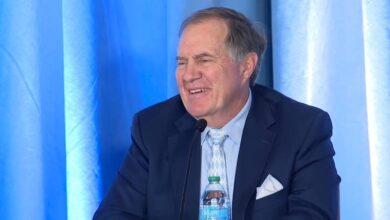Medicare Advantage is popular with NC seniors, but the program has come under increased scrutiny.


By Grace Vitaglione
This article was written with the support of a journalism fellowship from The Gerontological Society of America, The Journalists Network on Generations and The Silver Century Foundation.
Linda Duffy, 83, got sick of the “games” that she says UnitedHealthcare played with health care providers over negotiating contracts. Duffy, who lives outside Raleigh, was enrolled in a Medicare Advantage plan under UnitedHealthcare, a private insurance company that administers her Medicare benefits.
In the fall, UnitedHealthcare and Duke Health ended a months-long standoff over contract negotiations just ahead of a Nov. 1 deadline. The company also had a contract dispute with UNC Health earlier in 2024, WRAL reported.
Although both disputes were resolved, the incidents worried Duffy, who sees providers at UNC Health Rex.
“If they didn’t settle, I would lose everything,” Duffy said. “They did, but sitting there waiting and not knowing…”
So, to be sure, she switched to a new Medicare Advantage plan, this time administered by the health insurer Aetna.
The open enrollment period for Medicare ends Dec. 7, in which anyone with Medicare coverage can change their Part D plan, or prescription drug coverage plan, as well as switch to a Medicare Advantage plan if they choose. If someone is already enrolled in a Medicare Advantage plan, they can switch to a different one during this time window.
John L. Faulkenberry, 80, used the open enrollment period this year to switch away from a UnitedHealthcare plan. He sees an eye doctor, kidney doctor and heart doctor at Duke Health, and didn’t like worrying over losing coverage if the dispute had not been settled. So he signed up for a Medicare Advantage plan under Blue Cross Blue Shield.
The confusion was too much, he said.
Over half of the 2.2 million Medicare-eligible North Carolinians are in Medicare Advantage plans, and that number is growing. Instead of “traditional” Medicare, where the federal government pays for every beneficiary’s test, appointment or hospital stay on a fee-for-service basis, the government pays private insurance companies to create Medicare Advantage plans, and pays the insurers a set monthly amount for each patient to administer their care.
Many older adults like the extra benefits associated with Medicare Advantage plans, such as hearing and dental coverage, or even gym benefits.
But some are nervous about the possibility of their doctor leaving the networks created by the plans. Some companies that offer the plans are also seeing pushback for forcing patients to jump through hoops for care. And some critics say that the insurance companies are gaming the system to receive higher payments from the federal government.
Explosive growth for little understood plans
The Medicare Advantage program’s growth has “exploded,” said Jonathan Oberlander, a professor of Social Medicine and Health Policy and Management at the University of North Carolina at Chapel Hill. He also wrote a book on the political history of Medicare.
The Medicare Advantage program was officially established in 1997 under another name and was renamed “Medicare Advantage” in 2003. From 2010 to 2024, the number of North Carolinians enrolled in Medicare Advantage plans jumped from 244,000 to almost 1.2 million, according to data from KFF, an organization that provides health policy research, polling and journalism.
Only 30 percent of Medicare-eligible North Carolinians were enrolled in an Advantage plan in November 2016, compared to 55 percent in November 2024, according to data from the Centers for Medicare and Medicaid Services.
Part of the reason for this explosive growth has to do with aggressive marketing by the insurance companies, because the plans can be profitable. The federal government pays an additional amount on top of the usual Medicare reimbursement for the companies’ work managing the care.
But management can come with a cost for patients. The insurers often switch up what drugs they cover on their plans from one year to the next. The companies can force patients and doctors to jump through additional hoops — a process known as prior authorization — before they’ll approve some treatments, tests or doctor visits.
And sometimes they’ll drop patients altogether when they get too expensive — or patients leave on their own. The Wall Street Journal recently reported on a pattern of the sickest patients in Medicare Advantage plans dropping their plans just as their health needs soared. People in the final year of their lives needed more care, and to get it, they had to abandon Medicare Advantage plans. Those patients ended up switching to traditional Medicare at double the rate of other enrollees from 2016 to 2022.
Nonetheless, a 2022 study by KFF found Medicare Advantage enrollees and traditional Medicare beneficiaries reported similar levels of satisfaction with care.
Plans in North Carolina
Medicare Advantage plans come in a dizzying array of choices; the average beneficiary in North Carolina will have a choice of 44 Medicare Advantage plans for 2025, according to KFF.
The array of plans to choose from can be a “mixed blessing,” said Tricia Neuman, senior vice president of KFF and executive director of its Program on Medicare Policy. While people like choice, beneficiaries need to think about the tradeoffs of signing up for Medicare Advantage versus traditional Medicare.
Plans differ by county.
As of November 2024, over 25,000 people in Mecklenburg County and over 20,000 people in Guilford County were enrolled in a UnitedHealthcare plan, according to data from CMS. Another 14,000 in Mecklenburg and almost 19,000 in Wake County were enrolled in a Humana plan.
So far, Duffy — who lives in Wake County — has liked her experience with the Aetna plan. Her right leg “gave out” and then her left, but she was able to do three months of physical therapy, all covered by Aetna.
“About two weeks ago the physical therapy ended, and I’m walking fine,” she said.
But some consumers have struggled with their Medicare Advantage plan’s limited network or the plan denying and/or delaying care. And once someone is enrolled in Medicare Advantage, it can be harder to switch back to original Medicare.
Through Sept. 30, the NC Seniors’ Health Insurance Information Program identified 107 Medicare Advantage complaints for 2024.
Jumping through hoops
The dreaded prior authorization process takes place when health plans require approval of a medical service or prescription before the patient can receive it.
The goal for insurers is to avoid unnecessary or inappropriate utilization of health services, said Neuman. But she said the concern is that prior authorization often results in patients having needed care delayed — or not receiving that care at all.
Over 90 percent of physicians said that “one or more of their patients have suffered significant harm because of delays tied to prior authorization,” said Bruce Scott, president of the American Medical Association, in an article by Skilled Nursing News. Twenty-four percent of physicians said that delay resulted in hospitalization, permanent disability or death.
Prior authorization can add to the time and burden for physicians and hospitals, so some providers and hospitals are opting to leave Medicare Advantage networks, Neuman said.
Providers’ concerns include denials for care that may have already been delivered and late payments from the plans. Other prior authorization restrictions may make it difficult to discharge patients to a nursing home in their area, Neuman said.
A U.S. Senate report released Oct. 17 found that UnitedHealthcare, Humana and CVS have used prior authorization to “boost profits” by denying prior authorization requests for costly post-acute care at far higher rates than for other types of care.
Appeals are possible
Prior authorization can make it difficult for someone in the hospital to get placed in post-acute care such as a rehabilitation facility, said Ted Smith, CEO of Hillcrest Convalescent Center, which offers post-acute care in Durham.
Some hospitals have agreed to start the prior authorization process earlier, he said, because people that no longer had acute needs “were being forced to stay in the hospital an extra day, two days, three days, just waiting for prior approval.”
Health plans may also use algorithms to determine how long a patient should stay at the post-acute care facility and may end up trying to discharge them before they’re ready, Smith said.
“Oftentimes, someone with a Medicare Advantage plan doesn’t get the chance to come for short term rehab after a hospital stay, or they don’t stay as long as a traditional Medicare patient,” he said.
Patients who do want to stay longer and appeal a notice of discharge usually win, but most don’t appeal, he said.
“We advocate for patients that continue to need our services, but oftentimes, the insurance company makes a decision, regardless, that we think is counterintuitive,” he said.
Smith has heard similar concerns from his industry peers, and as more people enroll in Medicare Advantage plans, the issue has become “more pervasive.”
Too many taxpayer dollars?
The fact that over half of the program’s beneficiaries are enrolled in private plans administered by large, for-profit insurance companies has “big implications” for the policy and the politics around the program, UNC health economist Oberlander said.
For starters, he said there’s “a long history” of the federal government overpaying companies for Medicare Advantage plans.
Medicare Advantage was created with the hope of saving money for the sprawling federal Medicare program, but Oberlander argued private Medicare plans have never saved the federal government money.
When the program was initiated, payments were set at a little less than the cost of an average beneficiary, Oberlander said. The government also offered higher payments in areas that had few-to-no Advantage plans available as an incentive for the plans to offer coverage there.
For decades, he said, private plans enrolled people who were healthier than the average beneficiary, who also ended up costing less. Insurers were able to keep what they didn’t spend on patients.
Part of the sorting is self-selection, as there’s evidence sicker people disenroll from Advantage plans and go back to original Medicare, said Oberlander, something the Wall Street Journal also found in their analysis. Other patients may need more specialist care and therefore shy away from the limited provider networks associated with Medicare Advantage plans.
The plans themselves also encouraged healthier beneficiaries to join by highlighting gym memberships and other perks designed to appeal to younger, healthier patients. The federal government tried to address this by introducing risk adjustment mechanisms to encourage plans to take on riskier patients, he said.
Some plans have learned how to game the system to maximize their payments, Oberlander said.
For instance, Medicare Advantage companies can receive an even greater payment enhancement for a patient — such as someone with advanced heart disease or diabetes — who has been diagnosed and found to be at greater risk for more problems and, potentially, more cost.
But in recent years, plans have artificially “upcoded” many patients, portraying beneficiaries as sicker than they really are, and reaping higher reimbursement as a result. An October report from the Office of the Inspector General found evidence that insurance companies argued that these patients were sicker and then never provided follow-up visits, or extra procedures, tests or supplies.
In the last year alone, UnitedHealth Group — the same company that tussled with Duke Health and UNC Health — received $3.7 billion in this type of dubious payment by diagnosing patients with serious chronic illnesses but then delivering no follow-up care, STAT reported.
‘A constraint in Congress’
Payment reform is needed, but won’t be easy to achieve, Oberlander said. The overpayments are inefficient and costly to taxpayers while letting the companies off easy, but the Medicare Advantage lobby has grown powerful.
“Medicare has effectively been privatized from within, and [insurers] have a vested interest in overpayments continuing, he said.
“Medicare beneficiaries who are getting supplemental benefits because of the overpayments have a financial interest in overpayments continuing,” he said. “That creates a constraint in Congress, because nobody wants to face constituents who are losing benefits, even if they’re financed by excess payments that these plans shouldn’t get.”
Despite the alleged overpayments, Medicare Advantage plans spend 9 percent less on medical services than original Medicare spends for comparable enrollees, according to a recent analysis in the Journal of the American Medical Association. The authors argued the plans more than offset any spending on extra benefits through techniques such as network restrictions, prior authorization and financial incentives for health care centers and clinicians to curtail expensive care.
Plan satisfaction
John McClellan of Wake County has been on a Medicare Advantage plan through Aetna for a few years; he said he likes his plan and the zero dollar premium it offers.
McClellan, 77, played cello for the North Carolina Symphony and had to have both shoulders replaced, as well as treatment for prostate cancer in 2021. Both services were covered.
“I’ve never been turned down and I’ve not had to get pre-approval for any of the specialties,” he said. “It’s what you would hope for.”
Paula Morvan, 78, has been on an Advantage plan through Alignment for two years and said it’s been a “good” experience. She lives in Orange County and chose the plan because it had the best rating with the lowest out-of-pocket cost available. The first year was a little difficult with working out billing errors, but those were resolved, she said.
Most of her providers are through Duke or UNC Health, and are covered under the plan. She doesn’t take any medications and doesn’t have any major health problems.
Morvan also said she appreciates the coverage of services like dental or vision, as original Medicare doesn’t usually cover those services.
Oberlander said the positive experience of many people with Advantage plans and the problems that exist within the plans can both be true at once.
“The reality is, it’s kind of messy. Traditional Medicare is a really important program; it has lots of strengths, but it’s got lots and lots and lots of weaknesses too,” he said.
What does the future hold?
The Biden administration took some tentative steps to curb overpayments to Medicare Advantage, but the future under President-elect Donald Trump is uncertain, Oberlander said.
The Centers for Medicare and Medicaid Services, which administers Medicare, proposed a rule Nov. 26 that aims to further “remove unnecessary barriers to care resulting from the inappropriate use of prior authorization and internal coverage criteria,” according to a press release.
Trump’s nominee to lead the agency is Mehmet Oz, who has been a supporter of Medicare Advantage, Politico reported. Oz previously ran for Senate in Pennsylvania with a “Medicare Advantage for All” plan that would expand the program.
A Republican administration and Congress may be more likely to favor the private insurance plans, but Trump is “unpredictable” and may want to strike a better deal, Oberlander said.
Project 2025, an initiative led by the conservative Heritage Foundation think tank, also proposed increased privatization of Medicare, such as making the default enrollment option Medicare Advantage plans.
Project 2025’s policies were created as a road map for the next conservative president, according to the website, although Trump’s campaign worked to distance him from the plan during the campaign.
“Making Medicare Advantage formally the default option — that would be very controversial,” Oberlander said. “I think it could be a contentious fight.”
The post Medicare Advantage is popular with NC seniors, but the program has come under increased scrutiny. appeared first on North Carolina Health News.










